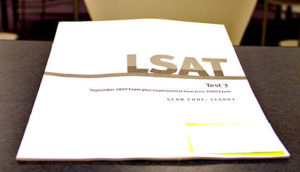I’ve struggled to write this blog, just like I’ve struggled to do most things for what amounts to a very long time now-so long that it feels like a lifetime and what came before only fragments of a not well remembered dream. In actual temporal time, it’s only a few years of melancholy and moderately severe major depression. But in the life of the mind, there is an unbridgeable chasm between the person I am now, who I once was, and who I want to become. I am so lost in my isolation that my only refuge is in turning inward; a strategy which offers no solace at all-only shame and regret.
I feel so isolated. I suppose that is one of the hallmarks of mental illness – detachment – that it seems impossible to relate to anyone. Furthermore, I’m not an attorney, just someone who has lived the hells and wonderful peaks of manic depression. My exposure to the law is through my father, my uncles, my cousins, and Dan Lukasik. I hope to go to law school one day, but I need to retake the LSAT first. So why write a blog? What good could it possibly do? Hopefully, some of the sentiments I describe will resonate with you. But hope is fickle; a thinly stitched veneer stretched tautly over an ever-widening mire of unfulfilled promise. When I look back at what I hoped for, most of it has faded into the mists of time with barely even the trace of memory or, worse yet, has been completely buried beneath the scars of regret.
In the face of my futility, my stupidity, my selfishness, my demons, hope that I can one day return the love and support that has been given me has allowed me to trudge on, kept me from giving up. Even if it flies in the face of all rational thinking, experience, and who you believe you are the sole advice I would deign to give is to no never give up hope that you can bring yourself to a better place and can make yourself into the person you wish to become. Though there be no reason to believe, allow belief to inspire you all the same.
“I can only stand apart and sympathize/ For we are always what our situations hand us/ It’s either sadness or euphoria.”
The above is a stanza from Billy Joel’s song “Summer, Highland Falls” that has always resonated with me. The song itself captures the sense of helplessness, at times even ironic apathy, I have felt towards a disease (or mental illness or whatever I should call it) that has allowed me to leap through the heights of “euphoria”, and to spiral down into the depths of suicidal depression, seemingly completely independent of any of the external aspects of my life.
I once told a friend that in the past three months I had had at least 45 “perfect days” (i.e., days that I could not imagine being any happier in), but that 45 was a conservative estimate and it was probably more. I’ve also spent weeks on end consumed by vivid images of ways in which I could gruesomely kill myself. And both of these emotions, which at the time feel so pervasive and all encompassing, occurred while living on the same college campus and surrounded by many of the same people. So it’s hard not to “stand apart and sympathize” with the fact that regardless of daily accomplishments or minor setbacks, or even in the face of significant change, it doesn’t matter what you do. That because of who you are, in a very intimate and fundamental sense, you are going to experience “either sadness or euphoria,” and you have little say in how intensely you are going to experience that emotion, or for how long (so let’s hope its euphoria, and it lasts forever).
This complete lack of control has always weighed on me as a moral failure because I’ve recognized what I consider the best version of myself-productive, engaged, intelligent, charming and yet, due to an inherent weakness, have been unable to maintain that persona consistently.
Instead I, and I would like to emphasize the contradiction and confusion surrounding a feeling at once of helplessness and simultaneously of complete responsibility for being who I am, have eventually always succumbed to periodic bouts of anxiety, negativity, and self-doubt. These periods have always been characterized by an intense sense of isolation in which almost palpable barriers are restricting me from coming into touch with the people and events surrounding me while at the same time engaging/suppressing the most endearing aspects of who I would hope to be as a person.
There are two types of sadness which result from this frustration and alienation.
Painful Sadness
There is a horrible, painful sadness. For me, this type of sadness is expressed through intense suicidal ideation-constant mental images meant to shock the senses into an acknowledgment of how base you are. Brutal beatings, stabbings, gouging’s, hangings. It consumes you until the idea is all there is and it takes every ounce of energy you have to beat it back. And it breaks your heart to see someone you love not to be able to say that this is how you feel, and it’s not their fault, but you are worlds away and mired in a sadness/loathing that is impossible to understand for those who have not yet experienced it. And they love you, so they are trying to understand, but, how could they? And this breaks your heart even more.
Cleansing Sadness
And there is also a beautiful, cleansing sadness. For me, this beautiful sadness feels more real than anything in the world. When I have been at the height of mania-during the happiest times of my life, I have still felt intimately in tune with songs that deal with regret-juxtaposing the inadequacy of the self with the intrinsic sublimity of some other-which you have failed.
There is a powerlessness to this beautiful sadness, an inevitability. It is real because it exists at the core of our most vulnerable selves, and therefore its expression comes out at a time when we are “most alive” and most in tune with our emotional intuition-when we are most ready to admit to and grasp on to that which we truly hope for and believe in. This sadness is not manifested in horrifying suicidal ideations but rather in the awe-inspiring idea that we are not worthy of the wonderful phenomena we call life. That we are ashamed of our ugliness amidst so much beauty and yet, in spite of our baseness, we have the opportunity to exist within as well as work towards some greater good.
Mania
In many senses, for me, the mania of bipolar has been synonymous with stripping away the debilitating fear and anxiety which were so constricting for so long, and a constant struggle has been not to glorify it. My Mom is taking a wonderful self-help course entitled “Fearless Living” and those two words, again from my experience, imbibe what it means to be manic or hypo manic; imbued with amazing amounts of self-confidence and gratitude, it’s unbelievably easy to live a carefree, upbeat, happy-go-lucky lifestyle, all the while being extraordinarily productive. Thus thinking in the binary can be dangerous-there is a natural tendency to see every aspect of the mania as better than every aspect of the depression.
However, beyond the fact that I have never been able to sustain mania, there is also a depth of feeling engendered by the sincere melancholy of depression that I have never encountered in the euphoric whirlwinds of mania. And I think the small silver lining to what is a dark cloud is the depth of meaning such great sorrow can expose you to-in a way an almost redemptive suffering. At the very least, though depression has taught me to hate myself many times over, it has also taught me to love life. The sad beauty of such a self-effacing distinction, to hate your being while loving your existence, is something to be thankful for and, hopefully in time, something to build off of for the future.
I would like to close this blog with what have for me been some solid building blocks for sheltering myself from, coping with, and eventually recovering from depression.
Exercise
When there seems to be nowhere to turn and the prospect of getting through the day seems unbearable, working out and (especially) yoga exercises are blocks of time where you don’t have to interact with other people, can be totally in your head, and when you’re done you feel a little better physically, even if not mentally. Really any small thing that you can do consistently and through which you can mark progress-I’m getting stronger, better endurance, or greater flexibility-is a wonderful way to establish extrinsic markers of success-I’m better at this than I was a few weeks ago, which, in turn, can catalyze good feelings about yourself as a person.
 Think of something you’ve always wanted to do or be good at, and then identify manageable steps that you can take on a consistent basis that gradually takes you towards your goal. Don’t say I need to be as good as someone else or make an arbitrary benchmark-rather say I want to get in better shape relative to how I am right now, so I’m going to run or go to yoga more often. Or I’ve always wanted to know how to tie my flies, shuffle a deck of cards, play an instrument, or speak a foreign language, so I’m going to work on this task a few minutes each day as opposed to watching TV or surfing the web.
Think of something you’ve always wanted to do or be good at, and then identify manageable steps that you can take on a consistent basis that gradually takes you towards your goal. Don’t say I need to be as good as someone else or make an arbitrary benchmark-rather say I want to get in better shape relative to how I am right now, so I’m going to run or go to yoga more often. Or I’ve always wanted to know how to tie my flies, shuffle a deck of cards, play an instrument, or speak a foreign language, so I’m going to work on this task a few minutes each day as opposed to watching TV or surfing the web.
Taking little steps like these that are working towards longer goals, even if you are not aware of any specific professional or extrinsic benefits to achieving those goals, can be inherently rewarding in and of themselves. If you’re better at an activity, any activity, then you were a few weeks ago, that can be one small thing that you feel good about, even as the rest of your world remains shrouded in darkness. It can help motivate you to get through the day, can serve as a spring towards other “productive” behavior, and eventually be something you can hang your hat on. However, it’s important not to beat yourself up after a day in which you failed to take your positive “step”-rather have a little self compassion and say tomorrow is a new day, and it’s not the end of the world, indeed its completely ok, that I wasn’t able to do anything “productive” today.
Finally, reading and writing can be extremely cathartic. Reading great literature can give you an emotional connection to characters, ideas, and feelings during a time when you felt completely isolated and estranged from the outside world. Fiction and non-fiction distract you from the constant stream of negative and self-critical thinking that can paralyze you. And, in a way similar to the steps discussed above, finishing a book you’ve always wanted to read or one on a subject that you’ve wanted to know more about, can generate a (no matter how small) sense of accomplishment that, no matter how insidiously it attempts to, the depression cannot take away.
On the other hand, for me, writing is more of a risk. I can be very critical of myself as a writer-a case in point is this blog which has been taxing at times-and sometimes end up feeling worse after sitting down to write. At other times, writing has been akin to therapy in that it has helped me to sincerely articulate-in the best way I know how the complex matrix of emotions enmeshed within me. Even if journaling or poetry don’t make sense to a single other person, the fact that they make sense to you can temporarily relieve part of the burden imposed by self-guilt and personal shame. It can be an outlet for your anguish, space where you can be authentically yourself. Sometimes, you can be so overwhelmed by your depressive thinking that you need some way to release that thinking-writing can be an effective way to do this.
In any case, don’t immediately sit down and assume that because of your depth of feeling you’re going to write the next great American novel. Rather start with a paragraph or a poem. It might end up being useless junk that you never look at again, and that’s ok, because part of what depression is, is a needless anguish and self-doubt that is inhibiting you in your quest to live a full life and should be discarded as soon as possible. But amidst the uselessness you may stumble upon small snippets of truth-a rhyming couplet here, a few sentences there-that satisfactorily express for you one of the tragic and meaningful aspects of your condition (or symbolically the human condition more generally). These small snippets are worth holding onto as they reflect the deeper truths embedded within a malaise that so often brings us to our knees and which, on sublimely rare occasions, reveals insights that one (I believe) can only obtain through suffering.
Anonymous
Further reading:
Writing Your Way Out of Depression
The Bipolar Disorder Survival Guide: What You and Your Family Need to Know
Yoga for Depression: A Compassionate Guide to Relieve Suffering Through Yoga
The Bipolar II Disorder Workbook: Managing Recurring Depression, Hypomania, and Anxiety
Is Bipolar II Easier to Live With Than Bipolar I














